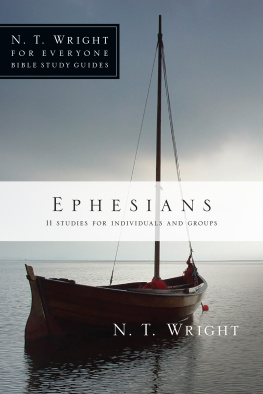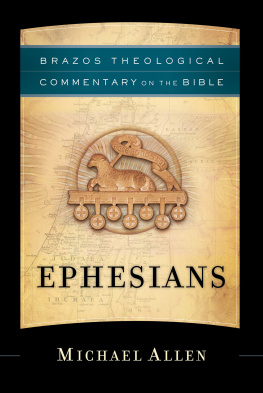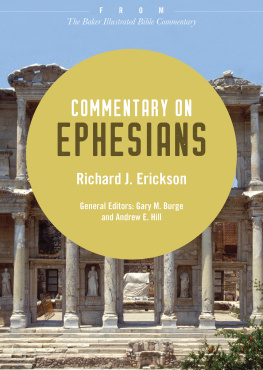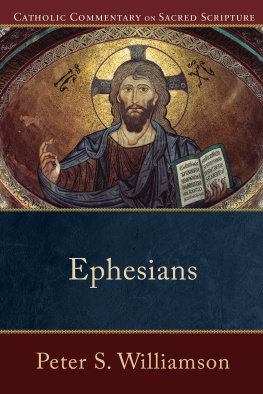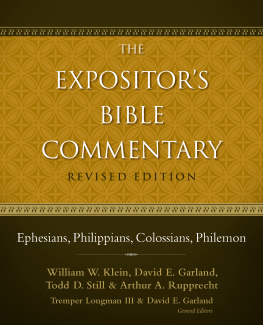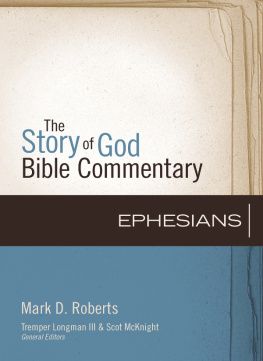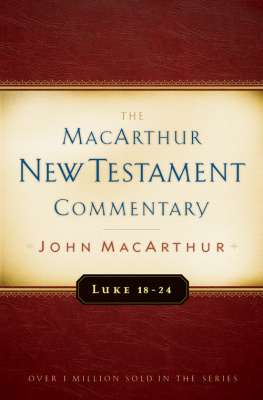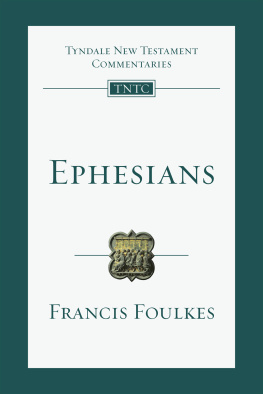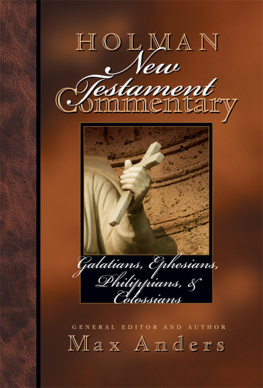Robert H. Gundry - Commentary on Ephesians
Here you can read online Robert H. Gundry - Commentary on Ephesians full text of the book (entire story) in english for free. Download pdf and epub, get meaning, cover and reviews about this ebook. publisher: Baker Publishing Group, genre: Religion. Description of the work, (preface) as well as reviews are available. Best literature library LitArk.com created for fans of good reading and offers a wide selection of genres:
Romance novel
Science fiction
Adventure
Detective
Science
History
Home and family
Prose
Art
Politics
Computer
Non-fiction
Religion
Business
Children
Humor
Choose a favorite category and find really read worthwhile books. Enjoy immersion in the world of imagination, feel the emotions of the characters or learn something new for yourself, make an fascinating discovery.

- Book:Commentary on Ephesians
- Author:
- Publisher:Baker Publishing Group
- Genre:
- Rating:3 / 5
- Favourites:Add to favourites
- Your mark:
- 60
- 1
- 2
- 3
- 4
- 5
Commentary on Ephesians: summary, description and annotation
We offer to read an annotation, description, summary or preface (depends on what the author of the book "Commentary on Ephesians" wrote himself). If you haven't found the necessary information about the book — write in the comments, we will try to find it.
Commentary on Ephesians — read online for free the complete book (whole text) full work
Below is the text of the book, divided by pages. System saving the place of the last page read, allows you to conveniently read the book "Commentary on Ephesians" online for free, without having to search again every time where you left off. Put a bookmark, and you can go to the page where you finished reading at any time.
Font size:
Interval:
Bookmark:
Commentary on Ephesians
Robert H. Gundry
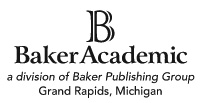
2010 by Robert H. Gundry
Published by Baker Academic
a division of Baker Publishing Group
P.O. Box 6287, Grand Rapids, MI 49516-6287
www.bakeracademic.com
Ebook edition created 2011
Previously appeared in Robert H. Gundry, Commentary on the New Testament (Baker Academic, 2010).
All rights reserved. No part of this publication may be reproduced, stored in a retrieval system, or transmitted in any form or by any meansfor example, electronic, photocopy, recordingwithout the prior written permission of the publisher. The only exception is brief quotations in printed reviews.
Library of Congress Cataloging-in-Publication Data for Commentary on the New Testament is on file at the Library of Congress, Washington, DC.
ISBN 978-1-4412-3767-5
GREETINGS
Ephesians 1:12
THE PRIVILEGES OF CHRISTIANS
Ephesians 1:33:21
BLESSING GOD FOR BLESSINGS PLANNED BY GOD THE FATHER, ACCOMPLISHED BY HIS BELOVED SON, AND APPLIED BY THE HOLY SPIRIT
Ephesians 1:314
A THANKSGIVING AND PRAYER
Ephesians 1:1523
THE SALVATION OF SINNERS BY GODS GRACE
Ephesians 2:110
THE RECONCILIATION OF GENTILES WITH GOD AND WITH JEWS
Ephesians 2:1122
PAULS SENSE OF PRIVILEGE IN PROCLAIMING THE SECRET OF THE CHRIST
Ephesians 3:113
A PRAYER FOR STABILITY THROUGH INCREASED COMPREHENSION
Ephesians 3:1419
A DOXOLOGY
Ephesians 3:2021
THE RESPONSIBILITIES OF CHRISTIANS
Ephesians 4:16:20
MAINTENANCE OF CHRISTIAN UNITY
Ephesians 4:116
MORAL CONDUCT
Ephesians 4:175:14
WISE BEHAVIOR
Ephesians 5:1521
A CODE FOR CHRISTIAN HOUSEHOLDS
Ephesians 5:226:9
EMPOWERMENT FOR BATTLE
Ephesians 6:1020
CONCLUSION
Ephesians 6:2124
My sincere thanks to Shirley Decker-Lucke, Editorial Director at Hendrickson Publishers, for accepting this exposition of the New Testament for publication; to Mark House, Phil Frank, and others for their work there on the publication; and to the Baker Academic team for their work on this reprint. My brother Stan Gundry, whose contributions to Christian publishing are deservedly well-known, encouraged me to write the exposition. Connie Gundry Tappy copyedited the manuscript. Her copyediting included not only the correction of errors and the refinement of style, but also a host of interpretive improvements and scriptural cross-references arising out of her comprehensive knowledge of the Bible. To her, my daughter as well as my copyeditor, I affectionately dedicate th is volume.
Robert H. Gundry
Westmont College
Santa Barbara, California
Dear reader,
Here you have part of a commentary on the whole New Testament, published by Baker Academic both in hardback and as an ebook. The electronic version has been broken into segments for your convenience and affordability, though if you like what you find here you may want to consider the whole at a proportionately lower cost. Whether in whole or in part, the e-version puts my comments at your fingertips on your easily portable Kindle, iPad, smartphone, or similar device.
Ive written this commentary especially for busy people like youlay people with jobs and families that take up a lot of time, Bible study leaders, pastors, and all who take the New Testament seriouslythat is, people who time-wise and perhaps money-wise cant afford the luxury of numerous heavyweight, technical commentaries on the individual books making up the section of the Bible we call the New Testament. So technical questions are avoided almost entirely, and the commentary concentrates on what will prove useful for understanding the scriptural text as a basis for your personal life as a Christian, for discussion with others, and for teaching and preaching.
Group discussion, teaching, and preaching all involve speaking aloud, of course, and when the New Testament was written, even private reading was done aloud. Moreover, most authors dictated their material to a writing secretary, and books were ordinarily read aloud to an audience. In this commentary, then, Ive avoided almost all abbreviations (which dont come through as such in oral speech) and have freely used contractions that characterize speaking (well, youre, theyve, and so on). To indicate emphasis in oral speech, italics also occur fairly often.
Youll mostly have to make your own practical and devotional applications of the scriptural text. But such applications shouldnt disregard or violate the meanings intended by the Scriptures divinely inspired authors and should draw on the richness of those meanings. So Ive interpreted them in detail. Bold print indicates the text being interpreted. Translations of the original Greek are my own. Because of the interpretations close attention to detail, my translations usually, though not always, gravitate to the literal and sometimes produce run-on sentences and other nonstandard, convoluted, and even highly unnatural English. Square brackets enclose intervening clarifications, however, plus words in English that dont correspond to words in the Greek text but do need supplying to make good sense. (As a language, Greek has a much greater tendency than English does to omit words meant to be supplied mentally.) Seemingly odd word-choices in a translation get justified in the following comments. It needs to be said as well that the very awkwardness of a literal translation often highlights features of the scriptural text obscured, eclipsed, or even contradicted by loose translations and paraphrases.
Literal translation also produces some politically incorrect English. Though brothers often includes sisters, for example, sisters doesnt include brothers. Similarly, masculine pronouns may include females as well as males, but not vice versa. These pronouns, brothers, and other masculine expressions that on occasion are gender-inclusive correspond to the original, however, and help give a linguistic feel for the male-dominated culture in which the New Testament originated and which its language reflects. Preachers, Bible study leaders, and others should make whatever adjustments they think necessary for contemporary audiences but should not garble the texts intended meaning.
Out of respect for your abilities so far as English is concerned, Ive not dumbed down the vocabulary used in translations and interpretations. Like the translations, interpretations are my own. Rather than reading straight through, many of you may consult the interpretation of an individual passage now and then. So Ive had to engage in a certain amount of repetition. To offset the repetition and keep the material in bounds, I rarely discuss others interpretations. But Ive not neglected to canvass them in my research.
On the theological front, the commentary is unabashedly evangelical, so that my prayers accompany this volume in support of all you who strive for faithfulness to the New Testament as the word of God.
Robert Gundry
Ephesians 1:12
1:12 : Paul, an apostle of Christ Jesus through Gods will, to the saints who are... and [who are] believers in Christ Jesus: Grace and peace to you from God, our Father, and the Lord, Jesus Christ. Pauls self-designation matches his self-designation in 2 Corinthians 1:1; Colossians 1:1; 2 Timothy 1:1 exactly, but see the comments on 1 Corinthians 1:1 for the meanings of the terms used. As usual, the saints describes the addressees as consecrated by God to himself. The very earliest and best manuscripts lack the phrase in Ephesus after we arehence the elliptical dots (...)and this lack corresponds to Pauls having heard about the addressees faith (1:15) and to their having heard about his ministry (3:2). By contrast, hed evangelized the city of Ephesus for more than two years and therefore knew the Ephesian Christians intimately, as they also knew him (Acts 18:1821; 19:120:1, 1738). Probably, then, so-called Ephesians was a letter circulated from Ephesus to outlying churches, so that the geographical location of the saints was to be filled in by the reader in accordance with the city where they were living. Compare Colossians 4:16, where Paul refers to a letter (quote possibly our very Ephesians) thats coming to Colossae from Laodicea, in which case the reader in Laodicea would have filled the blank with to the saints who are in Laodicea , and the reader in Colossae would have filled the blank with to the saints who are in Colossae . Paul balances his description of the addressees as consecrated by God with a description of them as believers, which refers to their exercise of faith. In Christ Jesus locates their faith and thus the believers themselves (compare 1:13, 15 and see the comments on Romans 8:811 for the meaning and rationale of believers location in Christ Jesus). The placement of Christ before Jesus gives Christ the connotation of a title: Messiah Jesus. For the rest of the greeting, see the comments on Romans 1:7; 1 Peter 1:2; 2 John 3.
Font size:
Interval:
Bookmark:
Similar books «Commentary on Ephesians»
Look at similar books to Commentary on Ephesians. We have selected literature similar in name and meaning in the hope of providing readers with more options to find new, interesting, not yet read works.
Discussion, reviews of the book Commentary on Ephesians and just readers' own opinions. Leave your comments, write what you think about the work, its meaning or the main characters. Specify what exactly you liked and what you didn't like, and why you think so.

